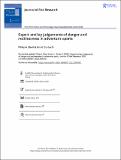Files in this item
Expert and lay judgements of danger and recklessness in adventure sports
Item metadata
| dc.contributor.author | Ebert, Philip A. | |
| dc.contributor.author | Durbach, Ian N. | |
| dc.date.accessioned | 2022-08-09T15:30:10Z | |
| dc.date.available | 2022-08-09T15:30:10Z | |
| dc.date.issued | 2022-06-28 | |
| dc.identifier | 280794908 | |
| dc.identifier | 7864d8ff-bf3b-4d34-95fa-808f206b2e00 | |
| dc.identifier | 85133077347 | |
| dc.identifier | 000817929200001 | |
| dc.identifier.citation | Ebert , P A & Durbach , I N 2022 , ' Expert and lay judgements of danger and recklessness in adventure sports ' , Journal of Risk Research , vol. Latest Articles . https://doi.org/10.1080/13669877.2022.2091001 | en |
| dc.identifier.issn | 1366-9877 | |
| dc.identifier.other | Jisc: 431878 | |
| dc.identifier.other | ORCID: /0000-0003-0769-2153/work/117211276 | |
| dc.identifier.uri | https://hdl.handle.net/10023/25804 | |
| dc.description | This work was supported by the Arts and Humanities Research Council AH/T002638/1 and the Royal Society of Edinburgh 62345_Ebert. | en |
| dc.description.abstract | We investigate differences in perceived danger and recklessness judgements by experts (experienced skiers, N=362) and laypeople (N=2080) about participation in adventure sports across the same judgemental task using a third person perspective. We investigate the relationship between danger and recklessness and the extent to which fatality frequency, as well as other contextual factors such as gender, dependants, competence, and motivations of the sports participant affect expert and laypeople judgements respectively. Experienced skiers gave lower overall danger and recklessness ratings than non-skiers. Experienced skiers’ judgements were also more sensitive than non-skiers’ to variations in the fatality rate of the activity and the competence level of the participant, yet were less sensitive to whether the event was done for external benefit such as a charity. Recklessness judgements were overall more sensitive to changes in activity descriptions than danger judgements. Our findings support the emerging picture of adventure sports participants as rational and sensitive to risk-relevant features rather than somehow pathological in their risk perception. | |
| dc.format.extent | 14 | |
| dc.format.extent | 1577671 | |
| dc.language.iso | eng | |
| dc.relation.ispartof | Journal of Risk Research | en |
| dc.subject | Risk perception | en |
| dc.subject | Uncertainty | en |
| dc.subject | Decision making | en |
| dc.subject | Moral dimension of risk | en |
| dc.subject | Adventure sports | en |
| dc.subject | RC1200 Sports Medicine | en |
| dc.subject | NDAS | en |
| dc.subject.lcc | RC1200 | en |
| dc.title | Expert and lay judgements of danger and recklessness in adventure sports | en |
| dc.type | Journal article | en |
| dc.contributor.institution | University of St Andrews. Arctic Research Centre | en |
| dc.contributor.institution | University of St Andrews. School of Mathematics and Statistics | en |
| dc.contributor.institution | University of St Andrews. Centre for Research into Ecological & Environmental Modelling | en |
| dc.identifier.doi | https://doi.org/10.1080/13669877.2022.2091001 | |
| dc.description.status | Peer reviewed | en |
This item appears in the following Collection(s)
Items in the St Andrews Research Repository are protected by copyright, with all rights reserved, unless otherwise indicated.

